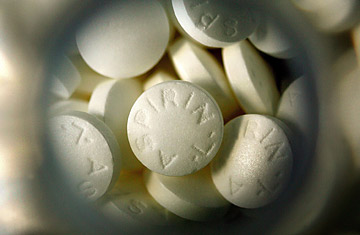
Research suggests aspirin may not be so effective a panacea after all.
There is no shortage of hard lifestyle choices people can make to reduce the chance of heart attacks, but one of the easiest has long been a daily prophylactic dose of garden-variety aspirin. But according to a long-term study published in the British Medical Journal, regularly taking aspirin does nothing to prevent heart attacks among a population particularly prone to them: diabetics.
Researchers at Scotland's University of Dundee administered aspirin, an antioxidant or a placebo to 1,276 adult diabetics with no initial symptoms of heart disease, and monitored their health for eight years. Neither the aspirin nor the antioxidant did any better than the placebo in reducing the incidence of heart attack or stroke.
Compared to the general population, diabetics are up to five times more likely to suffer from heart disease, and approximately 80% of people with the condition die from heart attack or stroke.
"Aspirin appears to offer no benefit at all," says professor Jill Belch, the study's principle author. "We need to think again about using it for primary prevention."
That flies in the face of guidelines issued by groups such as the American Heart Association that encourage people with diabetes to take aspirin as a preventative measure. "I expect these guidelines will be rewritten very rapidly," Belch told TIME.
However, the study's authors say that certain high-risk groups should take aspirin routinely. Studies have shown that among people who have previously suffered a heart attack or stroke, aspirin reduces the risk of subsequent events by 25%.
"The key message is to keep taking your aspirin if you've had a heart attack or stroke," Belch says. "But if you haven't had one and you're taking aspirin, check with your doctor because actually you may be causing yourself some harm."
Aspirin is known to cause ulcers and bleeding in the stomach, and is one of the most common causes for hospitalization for gastrointestinal bleeding in Scotland, she says.
Professor Peter Sever, an expert in clinical pharmacology at Imperial College London, says he has had several patients admitted to the hospital for severe bleeding, and that he routinely advises patients who have not had heart attacks to stop popping the pill. "An awful lot of people are self-medicating without evidence to support the overall benefits," he says.
(Click here for the A to Z Health Guide.)